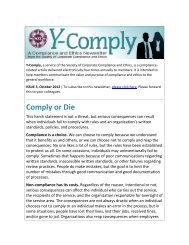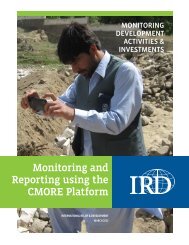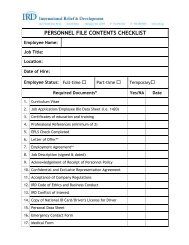Empowering citizens Engaging governments Rebuilding communities
Empowering citizens Engaging governments Rebuilding communities
Empowering citizens Engaging governments Rebuilding communities
You also want an ePaper? Increase the reach of your titles
YUMPU automatically turns print PDFs into web optimized ePapers that Google loves.
“That dramatic difference that life was getting better, it all had<br />
to do with CSP. Neighborhoods were being cleaned up, soccer<br />
leagues were starting, and businesses were opening. It wasn’t<br />
all done by the military. The partnership with CSP made all<br />
these things possible.”<br />
— Andrew Wilson<br />
In his influential work, political scientist John Kingdon<br />
explored the “sources of initiative” that create unique<br />
opportunities for change, either incremental or radical,<br />
in the sociopolitical sphere. These “policy windows”<br />
present themselves when internal and external government<br />
forces come into temporary alignment. “Despite<br />
their rarity,” Kingdon said, “major changes in public<br />
policy result from the appearance of these opportunities.”<br />
To stakeholder participants, action is often<br />
imminent when an issue “is really getting hot.”<br />
By November 2005, as violence worsened in Iraq, the<br />
direction of US policy in the country had gotten very<br />
hot. The US Senate voted overwhelmingly to require<br />
that the White House submit quarterly, unclassified<br />
reports to Congress on the war’s progress and, in a<br />
rare show of bipartisanship, agreed that Iraqi forces<br />
should begin to assume the lead in the war effort in<br />
2006, calling for a “campaign plan” that would outline<br />
the phased withdrawal of troops. In the House, Pennsylvania<br />
Rep. Jack Murtha, a well-known ex-Marine<br />
who had supported the war, issued a public call for<br />
the immediate withdrawal of US troops.<br />
“The war in Iraq is not going as advertised,” he said.<br />
“It is a flawed policy wrapped in illusion. The American<br />
public is way ahead of us.” Murtha was referring to<br />
public opinion, which had moved solidly against the<br />
war. A Newsweek survey released the same month<br />
showed support for the administration’s handling<br />
of Iraq had reversed since May 2003. “We cannot<br />
continue on the present course,” Murtha said.<br />
In late November, The Economist declared this time<br />
America’s “most bitter period of debate over the Iraq<br />
war so far.” The policy window was wide open.<br />
CSP origins: A new approach for<br />
international development<br />
On November 30, 2005, President George W. Bush<br />
unveiled the National Strategy for Victory in Iraq, a<br />
38-page plan outlining an endgame for the American<br />
military and an exit strategy intended to minimize<br />
further destabilization. The integrated strategy of the<br />
plan focused on a “security track” for neutralizing the<br />
insurgency, a “political track” for building democratic<br />
governance, and an “economic track” for creating a<br />
“sound and self-sustaining economy.” The strategic<br />
objectives underlying each track consisted of missions<br />
and tasks assigned to both military and civilian units.<br />
Although many had contributed to the document, The<br />
New York Times noted the strategy “strongly reflected<br />
23


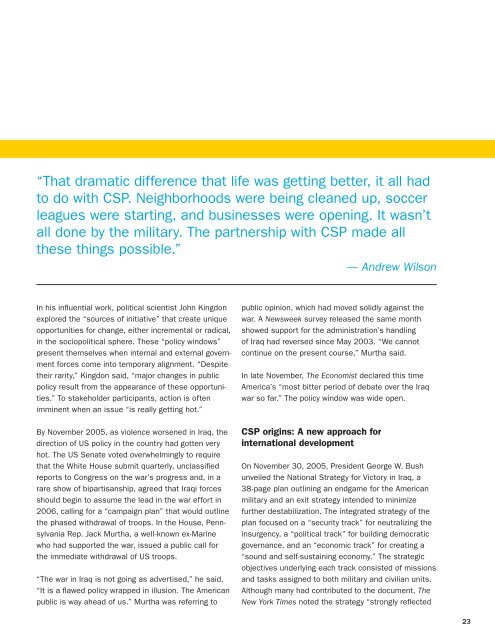

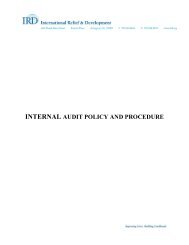

![Guide bonne pratique production d'oignon qualité_VF_4_2411012[1]](https://img.yumpu.com/23506639/1/184x260/guide-bonne-pratique-production-doignon-qualitac-vf-4-24110121.jpg?quality=85)

